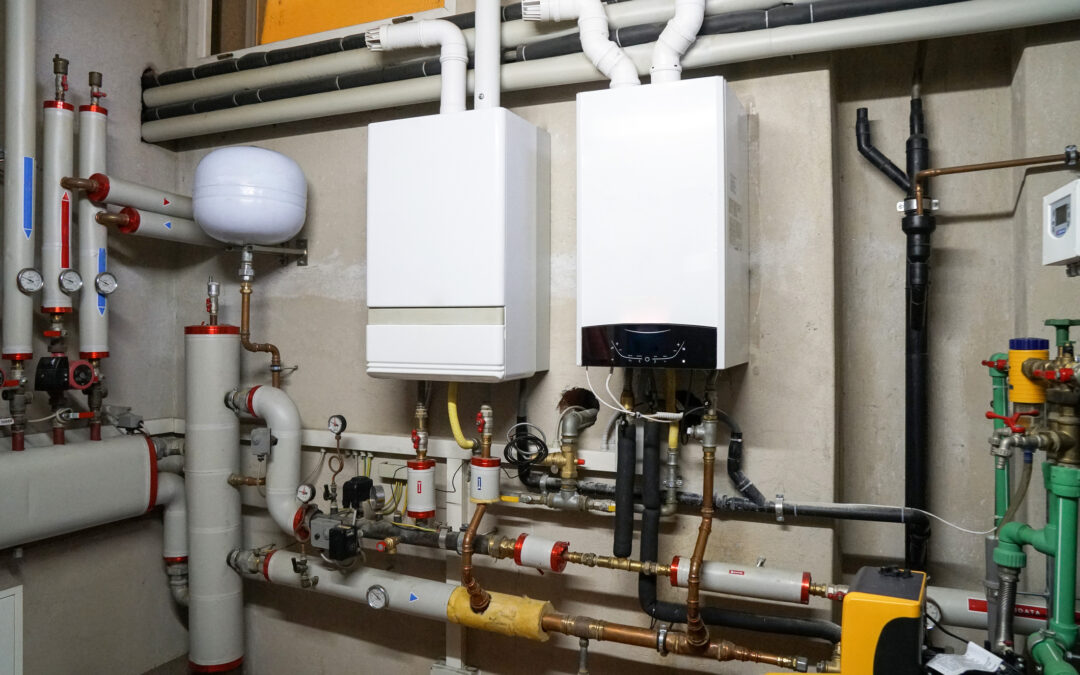Put simply, you should consider installing a condensing boiler. It’s a highly energy-efficient water heater that compared to a conventional boiler uses less fuel and reduces your running costs.
First, let’s take a look at how the condensing boiler works. With a conventional boiler, you burn fuel that produces hot gases which pass through a heat exchanger and the heat is transferred to the water. One of the hot gases that are produced in the combustion process is water vapour or steam, resulting from burning the hydrogen content of the fuel.
With a condensing boiler, additional heat is extracted from the waste gases by condensing the steam to liquid water. Thus you recover the latent heat of vapourization. This also creates a slightly acidic (3-5 pH) condensate, hence the term “condensing”.
Due to this condensate, you need to install a condensate neutralization drainage system. This is the only difference between a condensing and non-condensing boiler in a typical installation.
Merits of the Condensing Boiler
- Condensing boiler manufacturers claim that you can achieve up to 98% thermal efficiency compared to 70% to 80% with conventional boilers depending on the heating value of the fuels.
- Condensing boilers have the highest available energy efficiency in this category.
- Condensing boilers are more efficient than conventional boilers with lower fuel and running costs, reduced carbon dioxide emissions, and overall improved energy efficiency.
- Current condensing boilers are just as reliable as standard boilers, they don’t require any more servicing than conventional boilers.
- Condensing boilers typically allow for more turndown and are modulating versus traditional boilers.
Myths surrounding the Condensing Boiler
| A condensing boiler is too expensive | That myth might have been true when condensing boilers were first on the market. Today though, mainly due to the materials used in the construction of the heat exchanger, the cost is greater but still affordable. |
| A larger heat exchange surface is required | Depends… Typically, you don’t need to change the size of your radiators if you wish to install a condensing boiler. In many situations, the radiator is already built larger to deal with severe weather. |
| A condensing boiler only achieves high efficiency when fully condensing | A condensing boiler has a larger heat exchanger, thus it does not need to condense to be more efficient. It’s typical for a new gas condensing boiler to attain a seasonable efficiency of between 86% and 92% compared with a new non-condensing boiler at 78% or an older boiler at 55-65%. |
| A condensing boiler is more difficult to install | This really is a myth. Check out the differences in terms of installation between the condensing and the non-condensing boilers. The only difference you’ll find is the need for a condensate drain. An experienced installer won’t have a problem installing a normal, plastic overflow pipe or finding a suitable location for it. |
| Maintenance is more complex | The condensate drain is the only additional part that requires maintenance. When the boiler is serviced, the only additional task is to ensure the condensate drain is clear. |
| The water vapour is inconvenient | When flue gasses leave the condensing boiler they cool, which produces a mist or plume of water vapour around the flue terminal. This just shows that the boiler is working properly. However, when installing the condensing boiler, you need to consider the location of the boiler and the flue — which is something you always do anyway when conducting a site inspection. You don’t want the flue close to windows, other properties, and doors and paths that are used regularly in the winter months. |
| The liquid caused by condensation is a problem | With today’s systems, approximately one liter per hour of condensate is generated. It has about the same acidity as tomato juice (a pH of 3.5 to 5) and is easily emptied through a normal drainage system such as a simple plastic overflow pipe. |
| Reliability is an issue | That might be a myth that’s been hard to shift because it was true in the early days of condensing boilers. But not today. Considering past experience, the components of modern condensing boilers are as good and as reliable as those in the equivalent conventional boiler. |
| Existing systems make it impossible to install a condensing boiler | You can replace most existing boilers with a condensing boiler. It does not matter what type of boiler it is, you still need to check the effectiveness of the control system and the type of hot water cylinder. |
When you think of heating, you want comfort, reliability, energy efficiency, and reduced costs. A condensing boiler will give you all that. With a high-efficiency condensing boiler, you’ll have unparalleled comfort while enjoying unprecedented energy savings.
Considering installing a condensing boiler now? Contact Alliance Engineering today and we’ll walk you through these benefits and more!

